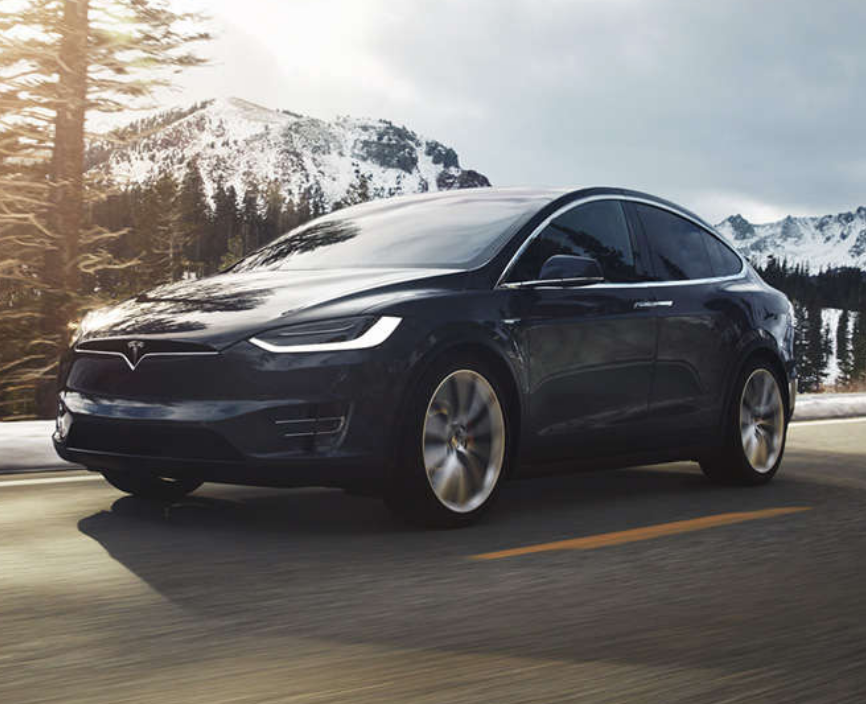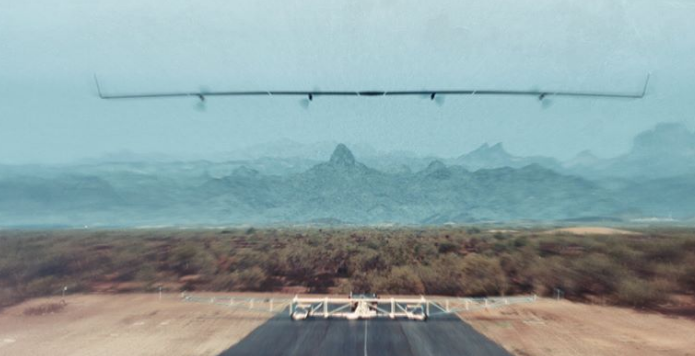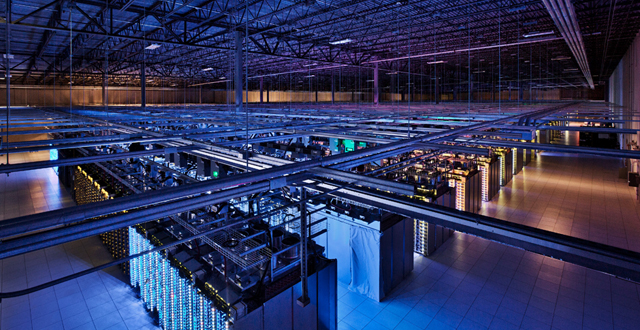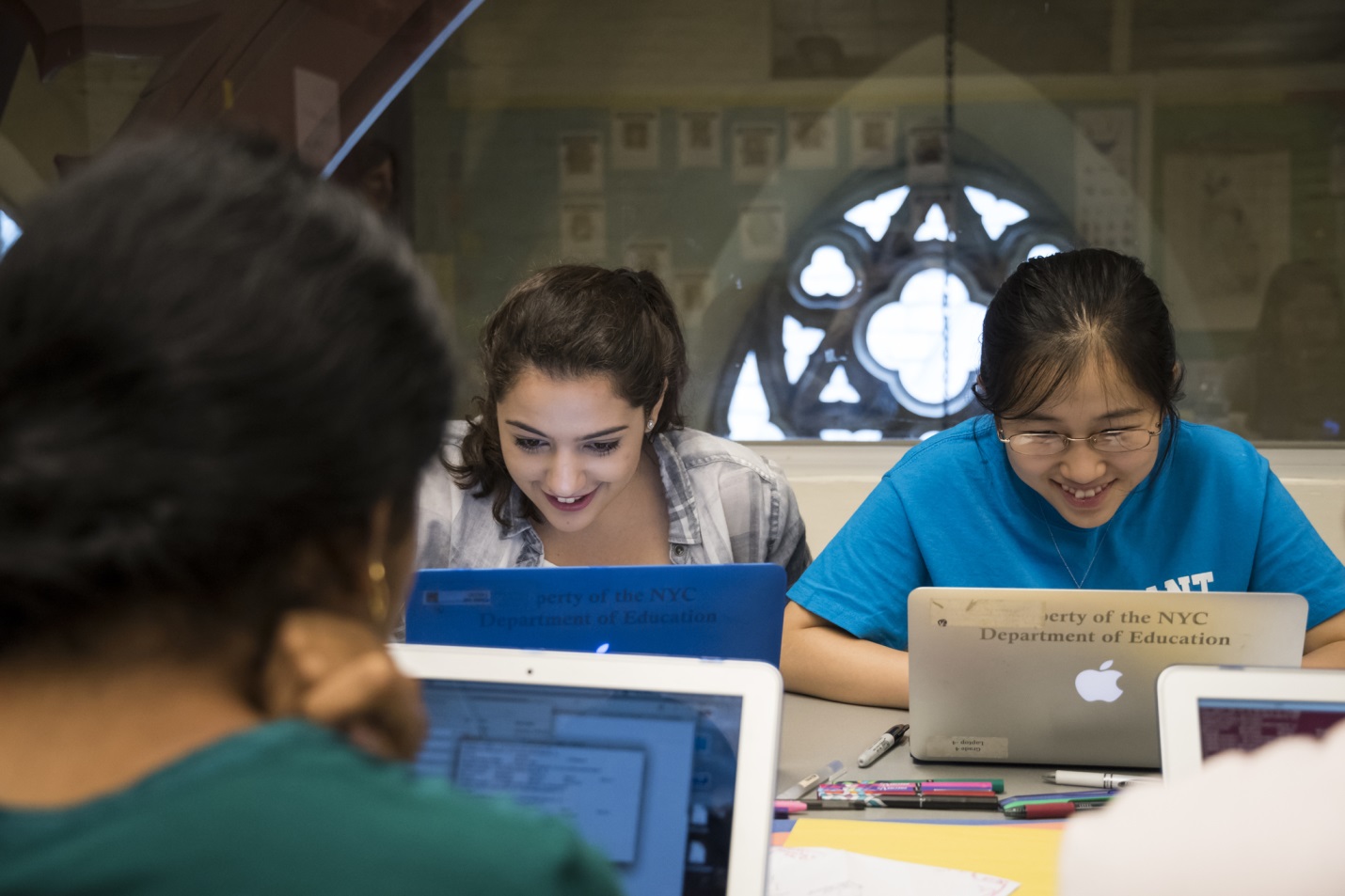By Nicole DiGiose, content editor
When a business isn’t just about business, people notice. These seven tech companies, known for their efforts to empower employees, safeguard the planet, and support local and global communities through technology, are among the most admired businesses in the world.
Tesla
New to the Fortune 500 list, automaker, energy storage company, and solar-panel manufacturer Tesla has been doing much more than raking in billions since its founding in 2003. Under the leadership of co-founder and CEO Elon Musk, the company’s commitment to social responsibility has extended beyond the environmental focus of its zero-emissions vehicles and alternative-energy products.
To make technology more broadly accessible, in 2014, Musk announced that his company would allow other individuals and organizations to use its patents. This corporate strategy directly benefits communities interested in using or developing technologies.

The Tesla Model X can travel up to 295 miles on a single charge. Image source: Tesla.
Tesla also scores points for its recognition of its employees as central to the success of the business. To keep those critical stakeholders motivated, Tesla offers a competitive compensation strategy as well as HR programs that enhance skills and encourage leadership development. The company offers further opportunities for employee development through collaborative programs with partner firms.
Of course, the products matter, too. Tesla’s luxury brand topped Consumer Reports’ latest automotive owner satisfaction survey, released this month.
The provider of the well-known, massively used Facebook social media platform was often in the news this year, though not always for the right reasons. Along with Google and Twitter, Facebook acknowledged at a congressional hearing in October that its platform had been an unwitting vehicle for the disinformation campaign that was part of Russian efforts to tamper with the 2016 U.S. presidential election. Facebook co-founder and CEO Mark Zuckerberg’s virtual-reality tour of Puerto Rico in the wake of Hurricane Maria was criticized as a tone-deaf plug for Oculus Rift. Facebook also acknowledged this month that too much time spent on social media can be bad for you, especially if your Facebook friends’ lives seem rosier than yours.
But with 2.07 billion monthly active users in the third quarter of 2017, the social network is one of the fastest-growing companies in the world. It has thrived in part by packing its platforms with mobile advertising and by investing in the development of acquisitions such as Instagram and WhatsApp. Along the way, the social media giant has honed a social-responsibility policy that includes initiatives in STEM education, internet access, and medicine.
In collaboration with internet.org, Facebook is building drones, satellites, and lasers to deliver the internet to everyone. Aquila, its first functional aircraft, runs on the same amount of power consumed by three blow dryers and is set to fly up to 90 days at a time, offering connectivity to an area 60 miles wide.

Facebook’s Aquila is a solar-powered plane that was made to beam the internet to remote parts of the world. Image source: Facebook.
Zuckerberg and his wife, Priscilla Chan, have pledged to donate 99% of their Facebook shares to the Chan Zuckerberg Initiative, a foundation focusing on science and education. They’ve committed $3 billion over 10 years for measures to cure, prevent, or manage disease, with the aim of eradicating many diseases during their children’s lifetimes.
Working for Facebook has its perks. According to its careers page and Glassdoor reviews, in North America, the company offers four months of paid time off for new mothers and fathers, along with $4,000 in “baby cash”; a wellness allowance to finance gym memberships or other health and wellness activities; free meals and snacks throughout the day; transportation support for a stress-free commute; on-site health and dental care; a gaming arcade; and, for its Menlo Park employees, a bike repair shop.
Microsoft
No stranger to the Fortune 500, Microsoft is a powerful giant sitting at the top of the cloud-computing market. But that doesn’t mean that it doesn’t care about the real world. The tech company’s corporate responsibility practices include applying the power of technology to safeguard human rights and protect the planet.
Microsoft is known for partnering with nonprofit groups and offering programs that support youth, entrepreneurs, developers, and others. Its TEALS (technology, education, and literacy in schools) program, for example, pairs technology professionals with teachers to co-teach computer science. The TEALS program aims to add 100 schools in the United States while bringing thousands of volunteers on board.

Microsoft Learning Tools help children with dyslexia to become independent readers. Image source: Microsoft.
The company is also passionate about designing products and services that are accessible to more than 1 billion people across the world with disabilities. It believes that there are no limits to what people can achieve when technology reflects the diversity of everyone who uses it. Microsoft touts such success stories as a dyslexic boy who was able to read independently for the first time with the help of Microsoft Learning Tools and a college student with athetoid cerebral palsy who uses Office Online and his communication device to promote inclusivity and inspire others to do the same.
For its employees, who run the show, Microsoft offers a career guide tool, which describes careers across the company and provides visibility to those opportunities to help employees manage their job roles. It also provides its staff with employee resource groups, networks, and social groups that help people with common interests or backgrounds to connect with each other. There are groups about pets, cooking, cultural backgrounds, and the environment, to name a few.
IBM
Having made its way to the Fortune 500 list 23 times, IBM is all about applied technology, continuous transformation, and sustainable change. The tech giant prides itself on pursuing the highest standards of corporate responsibility in every aspect of its business by developing programs that empower, improve, and advance society.
An example of innovation in action, IBM’s Science for Social Good initiative partners IBM Research scientists and engineers with academic fellows and experts from NGOs to tackle societal challenges. In the realm of artificial intelligence, IBM’s initiative on cognitive computing and the public good is marshaling AI capabilities to solve global problems.

IBM says that its cognitive technology is like having the best caseworkers on every case, translating into better protection for at-risk groups. Image source: IBM.
Each year, IBM also takes the time to recognize its employee volunteers who best exemplify the IBM values of dedication, innovation, and trust in their community support. And as an advocate for STEM education, IBM collaborates with P-TECH, a public-private model that connects secondary education directly to college and career.
Alphabet
It’s no surprise to see Alphabet, parent company of the popular Google, ranked sixth in Fortune’s list of the world’s most admired companies ; indeed, Alphabet has been riding high since its formation in August 2015. Most of the credit goes to its core unit, Google, which includes its money-printing search and advertising businesses, Android mobile operating system, YouTube video network, and recent expansions into car services and VR.
Google took some hits in the media this year for its unintended role in Russia’s election-tampering, and the rumor mill churned in late December when Eric Schmidt stepped down as Alphabet CEO and executive chairman, but the company whose name has become a verb isn’t going anywhere. Given Google’s data-center requirements, energy conservation and sustainability are a focus of its social responsibility initiatives.

Google data centers consume 50% less energy than typical data centers. Image source: Google.
Google data centers consume 50% less energy than typical data centers, and on its Mountain View, California, campus, 1.9-MW solar panels generate more than 3 million kWh of clean energy. Google has made an agreement to invest more than $1.5 billion in renewable energy projects, such as large-scale wind and rooftop solar panels. To date, 854,000 square meters of Google office facilities have achieved Leadership in Energy and Environmental Design (LEED) certification.
The internet giant has also reduced potable liters of water used per employee by 30% at its Bay Area headquarters. And it has been carbon-neutral since 2007.
Amazon
A high-ranking regular on the Fortune 500 list in recent years, internet-service and retailing king Amazon does lots of good for its employees, local communities, and energy conservation. In 2016, Amazon launched its first nationwide initiative with hunger relief organization Feeding America, donating excess food for distribution to those in need at the company’s U.S. fulfillment centers. Amazon also proudly employs more than 10,000 veterans and military spouses and plans to hire and train 25,000 more vets and spouses by 2021.

Amazon hosts Girls Who Code events to get more girls interested in coding. Image source: Girls Who Code.
Amazon’s Device Donation Program facilitates the donation of electronic devices and gift cards to schools located near Amazon fulfillment centers throughout the U.S. It also hosts Girls Who Code events to help get more girls interested in coding.
Amazon’s Career Choice Program prepays 95% of tuition for employees to take courses that train them for in-demand fields, such as in airplane mechanics and nursing. It even offers a Pay to Quit program, which gives $5,000 to warehouse workers who leave to pursue a more fulfilling job or career. And if employees need to work from home, the company lets them do so through the Amazon Virtual Contact Center.
Apple
Apple ranks first among the world’s most admired companies. After more than a decade of solid growth launched by its iPod music player and sustained by the iPhone, Apple appeared to a hit a wall, with a decline in sales for products such as the iPad and Apple Watch. But it remains the most profitable publicly traded company in the world, and it is heavily investing in software and expanding into new areas, including automobiles.
Apple’s social responsibility efforts are a priority that extends into the company’s corner offices. Lisa Jackson, vice president of the tech giant’s Environment, Policy, and Social Initiatives, reports directly to CEO Tim Cook. As a member of the Paulson Institute’s CEO Council for Sustainable Urbanization, Cook works with other CEOs of top Chinese and Western companies to advance sustainability in China.

Apple generates enough renewable energy to cover 96% of the electricity used at its facilities worldwide. Image source: Apple.
Apple supports local communities by encouraging its employees to get involved and make a difference. Since its launch in 2011, Apple’s Global Volunteer program has been responsible for more than $78 million in donations to charities and nonprofits around the world.
The company takes pride in empowering its workers by offering education and development programs, with thousands of its employees taking courses free of charge. Apple is also serious about gender equality in the workplace, and it has launched an 18-month program that aims to improve employee health and safety in the industry throughout the globe.
On the environmental front, the company generates enough renewable energy to cover 96% of the electricity used at its facilities worldwide. It also launched the Clean Water Program in 2013 and expanded it in 2015. Today, the cooling systems in its data centers can reuse water up to 35 times. Recycling is another global focus for Apple. The company offers recycling programs in 99% of the countries in which it operates, and it has diverted more than 508 million pounds of electronic waste from landfills since 2008.
Advertisement
Learn more about Electronic Products Magazine





